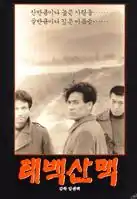The Taebaek Mountains (film)
The Taebaek Mountains (Korean: 태백산맥; RR: Taebaek Sanmaek) is a 1994 South Korean film directed by Im Kwon-taek. It is named for the Taebaek Mountains on the Korean peninsula.
| The Taebaek Mountains | |
|---|---|
 Poster to The Taebaek Mountains (1994) | |
| Korean name | |
| Hangul | |
| Hanja | |
| Revised Romanization | Taebaek Sanmaek |
| McCune–Reischauer | T‘aebaeksanmaek |
| Directed by | Im Kwon-taek |
| Written by | Cho Jeong-lae Song Neung-han |
| Based on | Taebaek Sanmaek by Jo Jung-rae[1] |
| Produced by | Lee Tae-won |
| Starring | Ahn Sung-ki Bang Eun-jin |
| Cinematography | Jung Il-sung |
| Edited by | Park Sun-duk |
| Music by | Kim Soo-chul |
| Distributed by | Taehung Pictures |
Release date |
|
Running time | 168 minutes |
| Country | South Korea |
| Language | Korean |
| Box office | $440[2] |
Plot
The film originates from the great river story Taebaegsanmaek consisting of 10 volumes written by Cho Jeong-rae. The story describes generational conflict between the haves (proprietors and landlords) and have nots (peasants) that eventually develops into right and left wing ideology, respectively. While showing why and how the conflict came about, the story depicts romantic, shamanic and Confucian aspects of the contemporaries. It provides a further insight into the politically controversial ideological issue on which the viewpoint is virtually hardened among over 40's in South Korea. This ideological issue survives even in the digital age to have a substantial effect on presidential elections. The author dares to show what the ideological conflict derives from and tries to describe it in detail and with artistic skill of commanding Korean colloquial language supplying its readers the true taste of Korean dialect expressions especially in its southwestern part Jeolla province.
Reception
Korean film scholar Kim Kyung-hyun described the reception of The Taebaek Mountains by audiences and critics as "lukewarm."[3]
Awards
Wins
- Blue Dragon Film Awards Best Film (1994)
Nominations
- Golden Bear, 45th Berlin International Film Festival (Im Kwon-taek) (1995)[4]
Presented
- Telluride Film Festival (1999)
References
- "Taebaek Sanmaek". The Complete Index to World Film. Archived from the original on 2011-07-20. Retrieved 2007-11-07.
- "The Tae Baek Mountains (1994)". Korean Film Council. Retrieved 2021-07-07.
- Kim, Kyung-hyun (2004). "3. 'Is This How the War is Remembered?': Violent Sex and the Korean War in Silver Stallion, Spring in My Hometown, and The Taebaek Mountains". The Remasculinization of Korean Cinema. Durham and London: Duke University Press. p. 87. ISBN 0-8223-3267-1.
- "Berlinale: 1995 Programme". Berlin International Film Festival. Retrieved 2011-07-07.
External links
- The Taebaek Mountains at AllMovie
- The Taebaek Mountains at IMDb
- The Taebaek Mountains at the Korean Movie Database